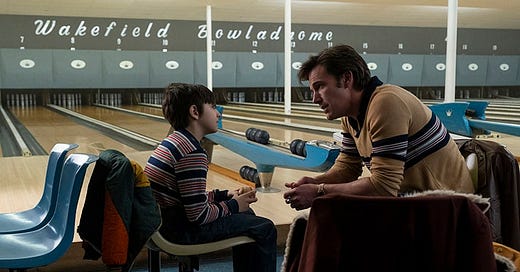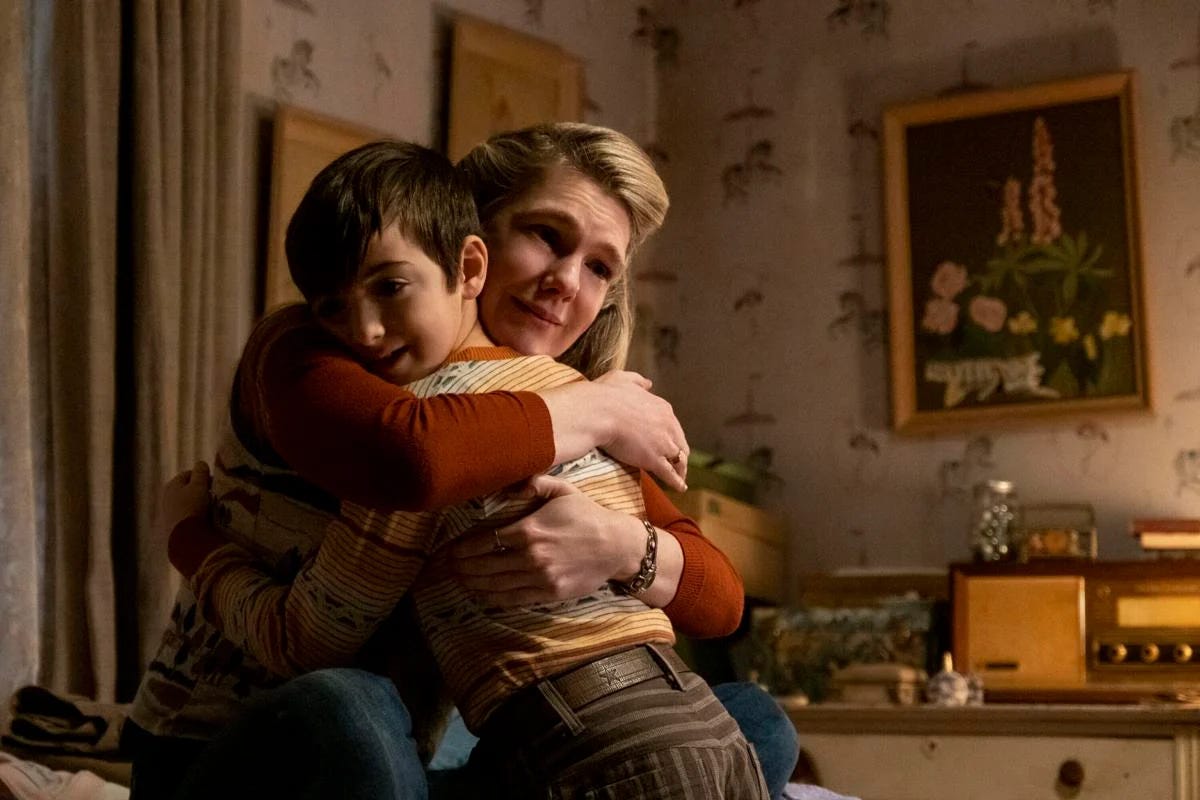Belle Affleck
Is Ben Affleck a better supporting player than a star? "The Tender Bar" says yes. Plus "The 355."
The following post was ready to go when the news came in this morning that Sidney Poitier has died. I’ve written a lot this week, maybe too much, but as one of the most important stars in the history of the movies — creatively and culturally — Poitier merits appreciation and then some. More to come.
The Nut Graf1: “The Tender Bar” (on Amazon Prime, **1/2 stars out of ****) is a touching but formulaic boy’s-life story saved by a terrific Ben Affleck as the hero’s worldly-wise uncle. Jessica Chastain, Penelope Cruz, and Lupita Nyong’o try with all their might but can’t make a silk purse of out the sow’s ear of “The 355” (in theaters, *1/2 out of ****)
“The Tender Bar,” which comes to Amazon Prime today after a theatrical release in December, is a reminder of how good Ben Affleck can be when he finds the right role. And it raises an interesting question: What if this guy wasn’t meant to be a movie star? What if he was a character actor who took a wrong turn early in his career?
The new movie is based on a 2005 memoir by journalist J.R. Moehringer, a much-admired recounting of the author’s dysfunctional Long Island childhood, his escape to Yale, and his early struggles after graduation, when he worries that he’ll be just another “fuckup” from a family of same. (Moehringer went on to a Pulitzer Prize for feature writing in 2000 and a profitable sideline in ghostwriting autobiographies for Andre Agassi, Nike co-founder Phil Knight, and – upcoming – Prince Harry. Not bad for a kid from Manhasset.) Directed with anonymous professionalism by George Clooney, the film version of “The Tender Bar” is a standard sentimentalized coming-of-age tale in structure and in content, especially in its second half, when the grown J.R. (Tye Sheridan) pines unto tedium for a fellow Yalie (an excellent Briana Middleton) who anyone can tell doesn’t love him.
The early scenes, however, star Daniel Ranieri as the young J.R., Lily Rabe as his exhausted single mom, Christopher Lloyd as his grandfather, and Affleck as his Uncle Charlie. They are all wonderful. Charlie owns the establishment of the title, The Dickens Bar, so named because he’s a self-taught bibliophile with a closet at home stacked to the ceiling with books. “When you’re 11 years old, you need an Uncle Charlie,” the adult J.R. says in voice-over, and this movie needs Ben Affleck as much as he needs it. Charlie lets the kid hang out with the regulars, weighs in on Thomas Aquinas from behind the bar, takes J.R. bowling – at the Wakefield Bowladrome in Massachusetts; not exactly Long Island but as someone who grew up watching “Candlepins for Cash” on Channel 7 I’m good with it – and offers instructions in the “male sciences.” An example: “Change a tire, jump a car, take care of your mother. And never, under any circumstances, hit a woman. Even if she stabs you with a pair of scissors.” A second pearl: “Read Orwell on the lower upper middle classes. They’re the ones who really suck. Once you understand that, you can operate in America, if you have a fucking car.”
Affleck makes Charlie simultaneously lazy, acute, hard-nosed, and gentle, and the timing in his line delivery is phenomenal. The part’s a perfect fit because Charlie is smart enough to see how life could have gone for him while turning the fact that it didn’t into a kind of enlightened blue-collar acceptance. He’s the most well-read guy in the bar and he’s the guy who owns the bar – but he’s still a guy in a bar, and the performance captures both a man’s pride and his understanding of waste.
How does that square with Ben Affleck? To me, his ongoing value as a public persona is that he can be a very, very good actor, but as a celebrity, he’s, well, kind of a fuckup. Maybe he’s even what you or I might be if we suddenly became movie stars – i.e., not very good at it. It has been fascinating over the years to see the intertwined career paths of Affleck and his “Good Will Hunting” co-star and co-writer Matt Damon, with Damon’s star ascending in a steady, well-managed rise while Affleck rises and falls in vertiginous loop-de-loops: Now an in-demand lead, now a public laughing stock, now a respected director with an Oscar on his shelf, now an unhappy and divorced Batman with a drinking problem. The image of “Sad Ben” that went viral in 2016, the actor sitting disconsolate and a million miles away as his co-star Henry Cavill nattered on during an interview for “Batman v. Superman,” was a pop-culture inflection point – the moment when Affleck seemed to confront his own stardom with existential defeat. (All it needed was a soundtrack, which some Internet wag promptly provided by slapping Simon and Garfunkel’s “Sound of Silence” over the video.)
The yinning and yanging of Ben Affleck, superstar, continues. His breakups (with Ana de Armas) and makeups (with long-time ex Jennifer Lopez) remain reliable fodder for the tabloids, he continues to put his foot in his mouth (or be taken out of context) during interviews, and he’s acting better than ever in supporting roles. His bottle-blonde Baron in last year’s “The Last Duel” was a delicious portrait of Machiavellian sleaze, and Uncle Charlie in “The Tender Bar” is an absolute keeper: A man whose illusions about himself have been burned away so cleanly that you wonder if the same might be true of the man playing him. Probably not. Probably there will be another turn of the wheel. This is what makes Ben Affleck interesting. This is what makes him one of us. There’s no such thing as “Sad Brad Pitt.”
A final tale out of school. I interviewed Affleck back in 2012, during the press tour for “Argo,” the film about the Iranian hostage crisis that he directed and starred in. As the representative of the region’s paper of record, I was able to have a one-on-one with him in a hotel meeting room, while the rest of the journalists had to do a group roundtable. This was Boston, remember – his hometown, where impressions are important and where you should never, ever think you’re “bettah than you ahh.” With me, the Boston Globe reporter, Affleck was thoughtful, erudite, and humble – letting me know he’d majored in Middle Eastern studies in college but also making clear he’d never graduated. With the roundtable journalists, I found out later, he was slouchy and profane, swearing up a storm and acting like “one of the guys.” He was acting, in other words. He was insecure. He wanted to be who he thought we wanted him to be. That need to be liked lies behind the false front of every smiling celebrity; indeed, it’s the subtext of fame itself. Somehow with Affleck it became the text. The mask most stars keep firmly fixed in place on him keeps slipping, which makes some people nervous and a lot of people scornful.
Somehow it just makes me like him more.
January is traditionally a Hollywood fire sale, when the studios release their most hapless misfires and pray that no one notices. “The 355” isn’t quite that bad, but it’s more interesting than good, and it says something that NBCUniversal could have simultaneously released the movie on the Peacock streaming service but chose to leave it twisting in the theatrical wind. Factor in Omicron, and movie’s DOA.
It’ll turn up on demand eventually, and it’s worth a look if you’re curious to see whether Jessica Chastain, Penelope Cruz, Lupita Nyong’o, and Diane Kruger can class up a boilerplate “Mission Impossible” knockoff. Chastain (who produced) is a nail-spitting CIA field agent, Kruger is her opposite number in German intelligence, Nyong’o is a computer genius working for MI6, and Cruz — whose performance in the currently-playing “Parallel Mothers” is one of the finest of her career — plays a Colombian psychologist drafted into the mayhem because only her fingerprint can unlock a cellphone critical to the plot. (“I’m not an agent, I’m a therapist!” Cruz barks at one point, thereby setting the stakes for Worst Dialogue of 2022 in the first week of January.) Everyone’s after a drive – that’s all they call it: “the drive” – that can bring civilization to a standstill (or something), and while the main characters initially battle each other in the interests of their respective governments, eventually they go rogue and band together and… you can take it from there.
Before everyone breaks out the automatic weapons for the grand finale, though, “The 355” feints toward a more thoughtful actioner. Chastain’s and Kruger’s characters are lone-wolf careerists, while Nyongo’s Khadijah has a supportive boyfriend at home and Cruz’s Gabriela has a family; there’s a good deal of talk about the pros and cons of emotional attachment and whether a super-spy can balance domestic bliss with saving the planet. “James Bond didn’t have to deal with real life,” complains Chastain’s Mace at one point, to which Khadijah responds, “James Bond always ended up alone,” a comeback that lands with the force of a nerf ball. Then Fan Bingbing turns up with the Asian market hopefully in tow, and “The 355” devolves into a bullet-spattered endurance test. It’s fun to see actors like Edgar Ramírez and Sebastian Stan get the short end of the stick that women usually get in movies like this, and Lupita Nyong’o remains one of the most charismatic figures on any screen anywhere. But if this is the best that Hollywood can do for her, that says a lot, none of it good. (NB: the title refers to a real-life female spy of the Revolutionary War, whose story would doubtless make a better movie than this one.)
If you enjoyed this edition of Ty Burr’s Watch List, please feel free to share it with friends.
If you’re not a paying subscriber and would like to sign up for additional postings and to join the discussions, here’s how:
If you’re already a paying subscriber, I thank you for your generous support.








